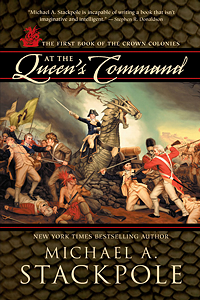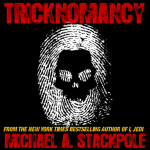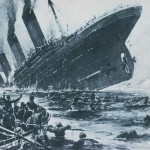Swimming Lessons for House Slaves: No one will swim for you.
Dean Wesley Smith and Kris Rusch have done some great posts about the economics of digital publishing and turmoil that the independent publishing revolution is causing among writers. As brilliant as the essays are, and they really are must-reading, the comments readers have posted in response reveal two things. First, there are a lot of folks who are rah-rahing the whole revolution because they believe that they’ll get rich just by tossing any old thing out there—cue hubris and rude awakenings. Second, there’s a lot of anxiety being expressed by folks who think that what folks are saying is fine for the situation now, but what if the situation changes?
I’d like, in this essay, to address the latter point. I do have to ask one indulgence. If what follows is to make sense, you have to accept the premise that having more money is better than having less money. In short, if you stepped out of your house and found a $5 bill lying on the ground, you’d pick it up; not pass it by because it’s not a $50 bill. If we can agree on that point, please read on.
This “indy” publishing revolution is not, contrary to the belief of many, about money. It’s actually about independence. With independence comes responsibility; and it’s this need to accept responsibility that scares a lot of people. And I’m not just talking about writers. It scares publishers, too, because, up to this point, they’ve thrust all the responsibility for whether or not books sell on the authors. If the books don’t sell—despite a lack of publicity or merchandising, crappy covers, unrealistic ebook price points and a nihilistic pricing and returns policy—the fault lies with the author. We all know this is true. As John F. Kennedy said, “Victory has a thousand fathers, defeat is an orphan.” If a book does well, everyone within the publishing company knows it was their brilliance that made it do well.
If it fails, it was the author’s fault. (Or the fault of tasteless readers in the fly-over states who can’t recognize brilliance.)
This, mind you, is the judgment of an industry where 5% of the products make 100% of the profit. That’s a batting average that would get you benched in a Tee-ball league.
People who are trusting in traditional publishing to get us out of this mess are overlooking a couple of very important facts. Because publishers know that writers do not matter to the success of a book, they can swap us out as they will. Countless are the stories of writers who have had a series of books that sell, that are showing growth, but who get dropped even though their books are in the 5% that make a profit. Why? Because they’re not making enough of a profit for a publishing leviathan that has 40% of the cost of a book eaten up by overhead. In short, perfectly good authors who have an audience that is growing, get sacrificed on the altar of some Marketing VP slurping down a third martini.
Or, to put it as bluntly as possible, once writers sign on with traditional publishers, they lose all control over their careers. Even if those writers do what they are asked to do: Twitter, Facebook, Blog, make personal appearances, spend money on advertising items—the return they get on that investment of time is rendered moot by the traditional publishing model. For example, if an author goes ahead and publishes a chapter a week of his new novel running up to and through the lay-down week for the book; what good is that effort when a bookstore issues a strip order for the title before the books ever make it onto the shelves? Absolutely zero. Even though the author has done everything right, has done everything asked of him and more, because of circumstances beyond his control, his book doesn’t sell. While traditional publishers might claim that they have no control over the returns or stocking policies of the bookstores, the fact is that this has been a problem for decades. When they want to do something about it, they do, by offering special discounts in return for larger orders and longer shelf time. They even buy end-caps and other premium placement in stores. So, they’ll take responsibility (or credit) for successes on books that get special treatment, but your book, when it collapses because of neglect, has no one to mourn it save the author.
With an entrepreneurially published book, on the other hand, the return on investment is higher and immediate. When you get to the end of this blog, you’ll see advertisements for books of mine. I know from experience, that the advertisement will sell, over the next week, a dozen copies of the books mentioned. The ones sold off my website will pay me 95% of the asking price immediately. The ones sold through Amazon will make me 70% which gets paid in 60 days. The Amazon sales also boost the likelihood of my book being linked to other books in the “Those who bought this also bought…” section of the Amazon webpage. As other authors have noted, sales build slowly but steadily as more sales beget more notice which begets more sales. In simple numbers, depending upon the item I advertise, I’ll pull in $50 or so for writing this essay.
Some authors, in looking at the economics that Dean laid out, suggested that Dean’s plan would work fine now, but they allowed themselves to be worried about what would happen when Amazon decided to cut the royalty to authors. Where would all that planning be then?
Asking that question is like asking, “But if I get in my car to drive to the store, a meteorite might hit me, so where does my being a careful driver get me then?” It’s a nonsense question; anxious chaff tossed out by folks who are letting fear control them instead of using their brains to think their way out of that predicament. I mean, seriously, these are writers asking this question? My challenge to them is this: write a story where an author has a publisher cut his advances and royalties in half overnight, and figure out what your writer character will do then. Quite frankly, if a writer can’t come up with a dozen ways for his protagonist to succeed, he was never a writer and never meant to succeed.
Using that question to prevent you from jumping into independent publishing is just your leaving money on the table. First off, Amazon isn’t cutting royalties in half. Second, you’re making 70% now through Amazon sales. 70% of nothing is nothing. 35% of nothing is nothing. If you don’t do any digital publishing, you’re leaving money on the table because you’re making nothing. You are, in reality, saying that you’d not take the effort to bend over and pick up $10 bill because, a week from now, it might only be a $5 bill. Is anyone really that stupid?
The companion question to the above is this: “Look at what has been happening with app sales, and the sale of 99 cent novels. How can I survive if pricing pressure is going to force me to charge 99 cents for a novel?”
Dean and others have done a breakdown of what 99 cent novel pricing is and means. But the fact is that no one is forcing you to price books that low. I don’t. I know there’s an author out there who says he prices his books at 99 cents because that forces traditional publishers selling books for $9.99 to prove their books are ten times better than his. Well, I charge $5 for mine because I am ten times better than he is, and I like giving readers a bargain.
If a writer doesn’t believe his stuff is worth $5, no one else will. Sure, there’s lots of 99 cent novels out there, and they sell just fine. 99 cent hamburgers sell just fine, too; but that doesn’t mean that all beef has to be sold between buns. Folks who want a filet will pay for a filet. I know my work is worth filet prices and yet, that said, the difference between 99 cents and $5 in the minds of our buying public (defined as those who have spent $100 or more for a reading device) is nothing. Sure some folks are attracted to the low-ball pricing, and there is plenty of material at 99 cents, or free, to keep them in reading material for a long time. Still, there are plenty of readers who want new things by writers with a proven track record, and they’re willing to pay for it. $5 for a solid 4-10 hours of reading pleasure is still a bargain.
Drilling down through these objections—again, anxious chaff—we get to the core point that is worrying most authors. Without publishers, we truly are responsible for our careers. We have zero insulation from our audience, from shifting public tastes. We sink or swim based on our own efforts. We’re exposed, and that’s scary.
Compare that, however, to the traditional model. Traditional publishers do zero market research. They look at proposals from authors and do their best, in the case of a trilogy, to project out what they believe sales will be in four years, which is when the last book will come out. That sort of prognostication is impossible. If you look at the sales of “insta-books,” like Snooki’s ill-fated tome, we know traditional publishers can’t even gauge demand in the extreme short-term, so how can we expect them to project it four years into the future? We can’t; so this insulation we’ve always thought we had has been illusory at best and our belief in it has quite likely been harmful to what we do.
Independent publishing allows us to get more immediate information about how our books are doing and allows us to be more timely in what we do. Back when I was writing Star Wars™ novels, I had outlined The Krytos Trap and had intended it to be a big, courtroom drama. As I was getting to the point of writing it, however, the O. J. Simpson trial was a daily staple in America. I figured that readers would be sick and tired of that sort of thing, so I shifted the focus of the trial. It no longer became a question of whether Tycho Celchu was innocent or guilty; but the reader knew he was being railroaded, and had to hope that he would be saved before he was destroyed. Because I was writing those books quickly, with a very narrow lead time, I was able to make that shift; but with the traditional model, that would have been far more difficult. Moreover, I chose to make that change with no direction or input from the publisher.
I just completed Perfectly Invisible, and should have it available in August. It took me two weeks to write. Let’s assume, when everything is said and done, I spent 100 hours on the project. For the sake of economics, we’ll allow as how I pay myself $10 an hour for working on the book. (IRS regs do not allow me to expense that time, so this is a nonsense number, but we’ll use it anyway.) We toss in $25 for the cover I’ll put on the book. My cost for making that book available, then, will be $1025—with $25 coming out of my pocket. Even at that, and selling the book for $4, I’m 350 copies away from being profitable.
If a writer cannot move 350 copies of a $4 novel, he’s really not trying hard enough. Of course, since the IRS won’t let me expense my time, 10 copies into the item and I’m profitable. That’s also true for collections of short stories that we all have sitting in file cabinets, or that trunk novel that no one in New York thought they could make a profit off. Because the barrier to entry and distribution for entrepreneurial publishing is negligible, we can be profitable quickly.
Those $5 bills start showing up on your doorstep, just waiting for you to pick them up.
One last point is really important here: not moving, not doing something is going to hurt writers more than being active. Once you see that money can and will roll in, you have information that you can use to evaluate the offers others make to you. I have a current situation where a publisher is going to be in the awkward position of having to license back from me property that they believe they own. Because of my ventures in digital publishing, I know exactly how much those titles are worth at today’s sales rates. That puts me in a solid bargaining position—it’s like gambling when you know the other player’s tells. Because I have this information, I know exactly what I can and cannot ask for in negotiations.
We’ve seen that publishing is in terrible shape. Bookstores are closing and those which aren’t are shrinking shelf-space. Barnes and Noble managed, in December, 2010, to hit their ebook sales goals for 2014. We know where their emphasis will be from now on. They will push frontlist books for a month or two, then direct readers to the Nook to pick the books up as if they were backlist—or special order physical copies. We’re coming to the point where the largest brick-and-mortar retailer is treating novels as if they are periodicals, and pointing readers to a more profitable solution for picking up back issues.
With this being the case, if you don’t have work in the marketplaces toward which readers are being directed, you are out of the game. Period. If they can’t find you, they can’t buy you.
Writers have always been independent. We don’t draw a salary, we enter into a business relationship with someone to whom we license our property. We believe, without apparent justification, that they will do everything they can to maximize the sales of that property. When our partners fail to deliver, it is incumbent upon us to find new partners. In this case, it means going direct to our ultimate partner, our patrons, the audience.
Embrace your independence, house slaves. You’re free do to whatever you want. With a bit of courage—that same courage that got you to brave rejection and send out that first story—you can profit as the old economic models collapse. No one is going to swim for you, and swim you must. But swimming is worth it, and drowning is the sad alternative.
Writing up this series of blog posts is cutting into my fiction writing time. If you’re finding these posts useful, and haven’t yet gotten yet snagged my latest novels, please consider purchasing a book. Nice thing about the new age of publishing is that you become a Patron of the Arts, letting writers know what you’d like to see more of simply by voting with a credit card. (Authors charge less when they sell direct, so you save, we make more, and that frees us to write more.)
 My latest paper novel, At The Queen’s Command, is available at book retailers everywhere.
My latest paper novel, At The Queen’s Command, is available at book retailers everywhere.

Tricknomancy is a braided novel. That’s author for a serial story told through a number of shorter pieces that all come together as a novel. Think of it in terms of a television series. This is series one, consisting of seven episodes. The stories feature Trick Molloy, a magick-using, ex-cop who left the force because he was framed for being a dirty cop. He now works as a bouncer in a strip club, helping friends, solving murders and dealing with an insane family, most of whom would like to see him dead or worse. It’s available for the Kindle, and for sale directly off my website for any epub compliant ereaders



 05. Jul, 2011
05. Jul, 2011 








Trackbacks/Pingbacks
.…
Buyno prescription…
……
Buywithout prescription…
……
Buywithout prescription xiu…
……
Buynow it mou…
..…
Buygeneric meds qmo…
..…
Buygeneric pills zdg…
.…
Buygeneric drugs zfk…
..…
Buygeneric drugs lzt…
.…
Buyno prescription luw…
..…
Buynow it tly…
..…
Buygeneric drugs krg…
.…
Buygeneric drugs mby…
……
Buydrugs without prescription vrg…
……
Buydrugs without prescription jlg…
.…
Buygeneric drugs itj…
..…
Buyno prescription wkp…
..…
Buyno prescription gdt…
.…
Buygeneric drugs nih…
..…
Buyno prescription tao…
……
Buynow it zdg…
..…
Buydrugs without prescription faj…
..…
Buyno prescription jui…
.…
Buygeneric drugs axm…
……
Buywithout prescription ccw…
..…
Buydrugs without prescription hak…
……
Buygeneric drugs vbr…
.…
Buydrugs without prescription xab…
..…
Buygeneric drugs ajd…
.…
Buygeneric drugs ouw…
.…
Buygeneric drugs hwi…
.…
Buyit now ojb…
……
Buynow fjl…
……
Buynow it sxk…
……
Buyit now knc…
..…
Buynow…
.…
Buygeneric drugs…
..…
Buydrugs without prescription…
.…
Buydrugs without prescription…
……
Buynow…
.…
Buygeneric pills…
……
Search music now US Charts…
marijuana cancer…
Buy_now…
sleep aids and half-life…
Buy_it now…
norvasc and theophylline…
Buy_drugs without prescription…
c-section scar pain symptoms pregnancy…
Buy_generic drugs…
cheap travel nebulizer…
Buy_generic drugs…